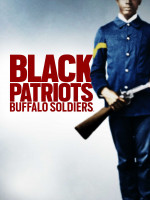Black Patriots: Buffalo Soldiers Filming Locations

We do not have enough information on the filming locations of Black Patriots: Buffalo Soldiers.
Black Patriots: Buffalo Soldiers Filming Locations
Black Patriots: Buffalo Soldiers (2022)
As the United States recovered from the bloody aftermath of the Civil War, Congress passed the Reorganization Act in 1866, that created the first-ever all-Black peacetime regiments. These six regiments would be reduced to four - the 9th and 10th Cavalry and the 24th and 25th Infantry - and soon earn the moniker Buffalo Soldiers. Although they never received the true and full recognition they deserved, Black Patriots: Buffalo Soldiers, will tell their remarkable story of their valor, bravery, and service. From the complicated skirmishes in the Southwest against Native Americans to the heroic battles on foreign soil to the ongoing fight to be treated as first-class citizens, the Buffalo Soldiers served with pride, dignity, and belief in defending a free America. This one-hour documentary introduces viewers to men, many of whom were formally enslaved, like George Jordan, who will learn to read and write in the Army and rise to the position of Sergeant and receive the Medal of Honor. Other significant figures include Horace Bivins and George Berry, who will upstage Teddy Roosevelt and his Rough Riders during the Spanish-American War; and Sgt. Henry Flipper, the first African American to graduate from West Point. However, with all the medals and valor on the battlefield, the Buffalo Soldiers were not immune to racism and professional setbacks. Soldiers like Colonel Charles Young, the third African American to graduate from West Point, will advance to Colonel but fall short of becoming the first Black General. With the help of military experts, historians, and Buffalo Soldiers' descendants, and supported with historic photography and documents, and original illustrations, Black Patriots: The Buffalo Soldiers recalls an important time in American history, spotlighting the soldiers that played a pivotal role in shaping and protecting the Nation. Their acts of resilience on and off the battlefield paved the way for future generations of African American military men and women. Their empowering story is as relevant today as it was over a century ago.
